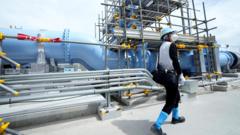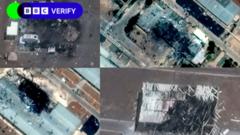In a significant policy reversal, Japan has announced plans to increase its reliance on nuclear power, just over a decade after the Fukushima disaster reshaped public sentiment on the topic. The new energy strategy, ratified by the cabinet recently, sets an ambitious goal for nuclear energy to contribute 20% of the nation's power supply by 2040—more than double its current share of 8.5%. This decision emerges as Japan grapples with rising energy demands driven by technology sectors, particularly AI and semiconductors, while also aiming to reduce carbon emissions and enhance energy independence.
Japan's Nuclear Energy Policy Faces a New Chapter Post-Fukushima

Japan's Nuclear Energy Policy Faces a New Chapter Post-Fukushima
Japan rethinks its energy future as it seeks to enhance nuclear reliance despite Fukushima's legacy.
The plan reflects the challenges Japan faces as it largely depends on imported fuel—over 90%—and seeks to navigate a complex global energy landscape with increasing costs, influenced by conflicts in Ukraine and the Middle East. According to Daishiro Yamagiwa, a member of parliament involved in the energy advisory committee, the government must explore all available energy sources in a balanced manner to ensure a stable supply.
However, the shadow of the Fukushima nuclear disaster, which occurred in 2011 following a devastating earthquake and tsunami, lingers heavily in the consciousness of the Japanese public. With the Fukushima Daiichi meltdown leaving a profound impact, many citizens are expressing deep skepticism and concern regarding a renewed commitment to nuclear energy. Tokyo resident Yuko Maruyama articulated this sentiment, voicing her fears for the safety of future generations and calling for alternative energy sources.
Experts are warning that while the government's ambitious plans include restarting several reactors, doing so is fraught with risks and logistical challenges. The reliance on imported uranium raises concerns about energy security, while the potential for catastrophic accidents remains a critical point of contention.
The proposal still requires parliamentary approval and will be debated in the coming months. Environmental groups like Greenpeace have also condemned the nuclear revival, emphasizing the long-term dangers and ecological consequences of radioactive waste management.
As Japan pivots towards a potentially nuclear-intensive energy framework, it must address public apprehensions while ensuring safety measures are paramount in the quest for a resilient energy future. The debate over the role of nuclear power in Japan continues, reflecting the complexities of energy policy in an era of global change.
However, the shadow of the Fukushima nuclear disaster, which occurred in 2011 following a devastating earthquake and tsunami, lingers heavily in the consciousness of the Japanese public. With the Fukushima Daiichi meltdown leaving a profound impact, many citizens are expressing deep skepticism and concern regarding a renewed commitment to nuclear energy. Tokyo resident Yuko Maruyama articulated this sentiment, voicing her fears for the safety of future generations and calling for alternative energy sources.
Experts are warning that while the government's ambitious plans include restarting several reactors, doing so is fraught with risks and logistical challenges. The reliance on imported uranium raises concerns about energy security, while the potential for catastrophic accidents remains a critical point of contention.
The proposal still requires parliamentary approval and will be debated in the coming months. Environmental groups like Greenpeace have also condemned the nuclear revival, emphasizing the long-term dangers and ecological consequences of radioactive waste management.
As Japan pivots towards a potentially nuclear-intensive energy framework, it must address public apprehensions while ensuring safety measures are paramount in the quest for a resilient energy future. The debate over the role of nuclear power in Japan continues, reflecting the complexities of energy policy in an era of global change.






















